NURSING MISC
Marshalltown Community College
Page 2 out of 45 results
Sort by
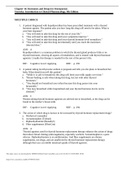
-
Chapter 16: Hormones and Drugs for Osteoporosis Visovsky: Introduction to Clinical Pharmacology, 9th Edition
- Exam (elaborations) • 9 pages • 2023
-
- $8.49
- + learn more
Chapter 16: Hormones and Drugs for Osteoporosis Visovsky: Introduction to Clinical Pharmacology, 9th Edition MULTIPLE CHOICE 1. A patient diagnosed with hypothyroidism has been prescribed treatment with a thyroid hormone agonist. The patient asks you how long this drug will need to be taken. What is your best response? a. “You will need to take this drug for the rest of your life.” b. “You will need to take this drug until your symptoms improve.” c. “You will need to take this ...
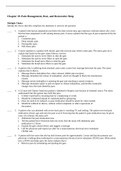
-
Chapter 19. Pain Management, Rest, and Restorative Sleep updated 2022/2023
- Exam (elaborations) • 15 pages • 2022
-
- $8.49
- + learn more
Multiple Choice Identify the choice that best completes the statement or answers the question. ____ 1. A patient who had an amputation just below the knee several days ago expresses confusion about why a foot that has been amputated is still causing intense pain. A nurse explains that the type of pain experienced by the patient is 1. Cutaneous pain. 2. Deep somatic pain. 3. Neuropathic pain. 4. Soft-tissue pain. ____ 2. A nurse explains to a patient with chronic pain that exercise may r...
![Chapter 21. Physical Assessment latest 2022 [100%c0mplete]](/docpics/6385e8900395b_2141693.jpg)
-
Chapter 21. Physical Assessment latest 2022 [100%c0mplete]
- Exam (elaborations) • 30 pages • 2022
-
- $9.49
- + learn more
Multiple Choice Identify the choice that best completes the statement or answers the question. ____ 1. A nurse wakes the patient for a focused assessment. The patient, trying to rest, tells the nurse, “I wish you would quit waking me up. Do you really need to keep bothering me?” The nurse appropriately responds: 1. “Most patients would love to get the attention that you are getting.” 2. “I understand your frustration, but this has been ordered by your physician.” 3. “It is ne...
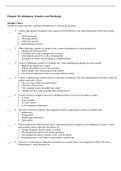
-
Chapter 20. Admission, Transfer, and Discharge updated 2022/2023
- Exam (elaborations) • 21 pages • 2022
-
- $9.49
- + learn more
Multiple Choice Identify the choice that best completes the statement or answers the question. ____ 1. A nurse appropriately recognizes that a patient will develop his or her initial impression of the nurse during the 1. Teaching process. 2. Discharge process. 3. Admission process. 4. Implementation process. ____ 2. When admitting a patient to a hospital unit, a nurse demonstrates a caring demeanor by 1. Smiling and speaking kindly. 2. Exhibiting tense body language and frowning. 3. I...
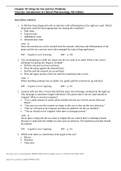
-
Chapter 18: Drugs for Ear and Eye Problems Vislosky: Introduction to Clinical Pharmacology, 9th Edition
- Exam (elaborations) • 6 pages • 2022
-
- $6.99
- + learn more
MULTIPLE CHOICE 1. A child has been diagnosed with an infection with inflammation in the right ear canal. Which drug route would be most appropriate for treating this condition? a. Oral route b. Topical route c. Ophthalmic route d. Intramuscular route ANS: B Since the external ear can be reached from the outside, infections and inflammation of the pinna and the ear canal are most often managed by topical drug application. DIF: Cognitive Level: Knowing REF: p. 330 2. You are preparing ...
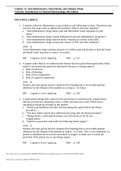
-
Chapter 12: Anti-inflammatory, Antarthritics, and Antigout Drugs Vislosky: Introduction to Clinical Pharmacology, 9th Edition
- Exam (elaborations) • 9 pages • 2022
-
- $7.49
- + learn more
MULTIPLE CHOICE 1. A patient with joint inflammation is prescribed an anti-inflammatory drug. The patient asks you how this drug works to address this problem. What is your best response? a. “Anti-inflammatory drugs reduce pain and limit blood vessel responses to joint injury.” b. “Anti-inflammatory drugs contain antibacterial and anti-inflammatory properties.” c. “Anti-inflammatory drugs limit the body’s response to cortisol in the body.” d. “Anti-inflammatory drugs incre...
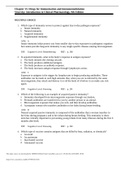
-
Chapter 15: Drugs for Immunization and Immunomodulation Vislosky: Introduction to Clinical Pharmacology, 9th Edition
- Exam (elaborations) • 6 pages • 2022
-
- $7.49
- + learn more
MULTIPLE CHOICE 1. Which type of immunity serves to protect against day-to-day pathogen exposure? a. Innate immunity b. Natural immunity c. Acquired immunity d. Supplemental immunity ANS: A Innate immunity helps protect you from smaller day-to-day exposures to pathogenic organism but cannot provide long-term immunity to any single specific disease-causing microorganism. DIF: Cognitive Level: Remembering REF: p. 280 2. In acquired immunity, what is the body’s response to antigen expos...
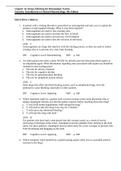
-
Chapter 14: Drugs Affecting the Hematologic System Vislosky: Introduction to Clinical Pharmacology, 9th Edition
- Exam (elaborations) • 10 pages • 2022
-
- $7.99
- + learn more
MULTIPLE CHOICE 1. A patient with a clotting disorder is prescribed an anticoagulant and asks you to explain the purpose of anticoagulant therapy. What is your best response? a. Anticoagulants are used to lyse existing clots. b. Anticoagulants are used to increase the flow of blood. c. Anticoagulants are used to prevent new clot formation. d. Anticoagulants are used to thin the viscosity of the blood. ANS: C Anticoagulants are drugs that interfere with the clotting process, so they are u...
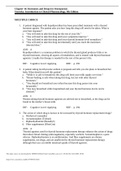
-
Chapter 16: Hormones and Drugs for Osteoporosis Vislosky: Introduction to Clinical Pharmacology, 9th Edition
- Exam (elaborations) • 9 pages • 2022
-
- $7.49
- + learn more
MULTIPLE CHOICE 1. A patient diagnosed with hypothyroidism has been prescribed treatment with a thyroid hormone agonist. The patient asks you how long this drug will need to be taken. What is your best response? a. “You will need to take this drug for the rest of your life.” b. “You will need to take this drug until your symptoms improve.” c. “You will need to take this drug until your thyroid hormone level normalizes.” d. “You will need to take this drug incrementally until...
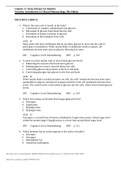
-
Chapter 17: Drug Therapy for Diabetes Vislosky: Introduction to Clinical Pharmacology, 9th Edition
- Exam (elaborations) • 9 pages • 2022
-
- $7.99
- + learn more
MULTIPLE CHOICE 1. What is the main role of insulin in the body? a. Conversion of complex carbohydrates into glucose b. Movement of glucose from blood into the cells c. Prevention of kidney excretion of glucose d. Prevention of the formation of fat cells ANS: B Many body cells have membranes that do not allow glucose to move into the cells to participate in metabolism. When insulin binds to membrane insulin receptors, the membranes become more open to glucose, allowing it to enter. DIF...

$6.50 for your textbook summary multiplied by 100 fellow students... Do the math: that's a lot of money! Don't be a thief of your own wallet and start uploading yours now. Discover all about earning on Stuvia


